#fool thou knows not the tender touch of a gentle lady
Explore tagged Tumblr posts
Text
honestly think it's a little funny that my reed900 content is what initially draws people to my account and then when they're settling in they realise I'm actually some nutjob with way too many feelings about RK Bros and by extension the RK Fam. I'm sorry the gays brought you here but I ignore them in favour of family and friendship so often.
and i'm very spiteful so i will not hesitate to abandon reed900 for as long as i see fit if someone tries to complain about me going off on tangents about other DBH characters. this is my circus and i will run it as i see fit. If I wanted advice from a clown, I'd turn to my mirror.
#thinking about the cold shoulder I got when I posted about my love for North and Chloe this one time#fool thou knows not the tender touch of a gentle lady#thy mother never lavished ye in her good grace#wait this also happened when I talked about Kara#wretched people of foul taste I will flood my fields with these fine women and make you watch as I reap the#rich rewards that love has sewn#moose rambles#LIGHTHEARTED BY THE WAY#dbh#detroit become human#moose posting
19 notes
·
View notes
Text
FICTIONAL CHARACTER ASK: ROMEO MONTAGUE
TAGGED BY: @princesssarisa
@ardenrosegarden @giuliettaluce @gravedangerahead
Favorite thing about them: Oh my sweet boy, he is a sensitive poet that only wants to distance himself of violence and to share his love (for Juliet and for love itself) with the world.
Least favorite thing about them: That fact that when Tybalt kills Mercucio, he blames Juliet for “turning him affeminate” (weak) and decides to kill Tybalt in relation, believing this will prove that he is “man enough”. This obviously is the biggest mistake he ever commited.
Three things i have in common with them:
-His melancholy.
-I also can sometimes find dificult to communicate my true feelings to friends and relatives.
-I also love Juliet Capulet.
Three things i don’t have in common with them:
-Nobility status.
-Training to fight with a sword.
-I can’t improvise poetic dialogue the way he can. And i don’t have his french.
Favorite line:
“I fear, too early: for my mind misgives Some consequence yet hanging in the stars Shall bitterly begin his fearful date With this night's revels and expire the term Of a despised life closed in my breast By some vile forfeit of untimely death”.
“What lady is that, which doth enrich the hand Of yonder knight?
O, she doth teach the torches to burn bright! It seems she hangs upon the cheek of night Like a rich jewel in an Ethiope's ear; Beauty too rich for use, for earth too dear! So shows a snowy dove trooping with crows, As yonder lady o'er her fellows shows. The measure done, I'll watch her place of stand, And, touching hers, make blessed my rude hand. Did my heart love till now? forswear it, sight! For I ne'er saw true beauty till this night”.
“ If I profane with my unworthiest hand This holy shrine, the gentle fine is this: My lips, two blushing pilgrims, ready stand To smooth that rough touch with a tender kiss”.
“But, soft! what light through yonder window breaks? It is the east, and Juliet is the sun. Arise, fair sun, and kill the envious moon, Who is already sick and pale with grief, That thou her maid art far more fair than she: Be not her maid, since she is envious; Her vestal livery is but sick and green And none but fools do wear it; cast it off. It is my lady, O, it is my love! O, that she knew she were! She speaks yet she says nothing: what of that? Her eye discourses; I will answer it. I am too bold, 'tis not to me she speaks: Two of the fairest stars in all the heaven, Having some business, do entreat her eyes To twinkle in their spheres till they return. What if her eyes were there, they in her head? The brightness of her cheek would shame those stars, As daylight doth a lamp; her eyes in heaven Would through the airy region stream so bright That birds would sing and think it were not night. See, how she leans her cheek upon her hand! O, that I were a glove upon that hand, That I might touch that cheek”!
“She speaks: O, speak again, bright angel! for thou art As glorious to this night, being o'er my head As is a winged messenger of heaven Unto the white-upturned wondering eyes Of mortals that fall back to gaze on him When he bestrides the lazy-pacing clouds And sails upon the bosom of the air”.
“ Shall I hear more, or shall I speak at this”?
“Amen, amen! but come what sorrow can, It cannot countervail the exchange of joy That one short minute gives me in her sight: Do thou but close our hands with holy words, Then love-devouring death do what he dare; It is enough I may but call her mine”.
“Ah, Juliet, if the measure of thy joy Be heap'd like mine and that thy skill be more To blazon it, then sweeten with thy breath This neighbour air, and let rich music's tongue Unfold the imagined happiness that both Receive in either by this dear encounter”.
“This gentleman, the prince's near ally, My very friend, hath got his mortal hurt In my behalf; my reputation stain'd With Tybalt's slander,—Tybalt, that an hour Hath been my kinsman! O sweet Juliet, Thy beauty hath made me effeminate And in my temper soften'd valour's steel”!
“ This day's black fate on more days doth depend; This but begins the woe, others must end”.
“Alive, in triumph! and Mercutio slain! Away to heaven, respective lenity, And fire-eyed fury be my conduct now”!
“O, I am fortune's fool”!
“Thou canst not speak of that thou dost not feel: Wert thou as young as I, Juliet thy love, An hour but married, Tybalt murdered, Doting like me and like me banished, Then mightst thou speak, then mightst thou tear thy hair, And fall upon the ground, as I do now, Taking the measure of an unmade grave”.
“ It was the lark, the herald of the morn, No nightingale: look, love, what envious streaks Do lace the severing clouds in yonder east: Night's candles are burnt out, and jocund day Stands tiptoe on the misty mountain tops. I must be gone and live, or stay and die”.
“ Let me be ta'en, let me be put to death; I am content, so thou wilt have it so. I'll say yon grey is not the morning's eye, 'Tis but the pale reflex of Cynthia's brow; Nor that is not the lark, whose notes do beat The vaulty heaven so high above our heads: I have more care to stay than will to go: Come, death, and welcome! Juliet wills it so. How is't, my soul? let's talk; it is not day”.
“Come hither, man. I see that thou art poor: Hold, there is forty ducats: let me have A dram of poison, such soon-speeding gear As will disperse itself through all the veins That the life-weary taker may fall dead And that the trunk may be discharged of breath As violently as hasty powder fired Doth hurry from the fatal cannon's womb”.
“Art thou so bare and full of wretchedness, And fear'st to die? famine is in thy cheeks, Need and oppression starveth in thine eyes, Contempt and beggary hangs upon thy back; The world is not thy friend nor the world's law; The world affords no law to make thee rich; Then be not poor, but break it, and take this”.
“I pay thy poverty, and not thy will”.
“There is thy gold, worse poison to men's souls, Doing more murders in this loathsome world, Than these poor compounds that thou mayst not sell. I sell thee poison; thou hast sold me none. Farewell: buy food, and get thyself in flesh. Come, cordial and not poison, go with me To Juliet's grave; for there must I use thee”.
“How oft when men are at the point of death Have they been merry! which their keepers call A lightning before death: O, how may I Call this a lightning? O my love! my wife! Death, that hath suck'd the honey of thy breath, Hath had no power yet upon thy beauty: Thou art not conquer'd; beauty's ensign yet3040 Is crimson in thy lips and in thy cheeks, And death's pale flag is not advanced there. Tybalt, liest thou there in thy bloody sheet? O, what more favour can I do to thee, Than with that hand that cut thy youth in twain To sunder his that was thine enemy? Forgive me, cousin! Ah, dear Juliet, Why art thou yet so fair? shall I believe That unsubstantial death is amorous, And that the lean abhorred monster keeps Thee here in dark to be his paramour? For fear of that, I still will stay with thee; And never from this palace of dim night Depart again: here, here will I remain With worms that are thy chamber-maids; O, here Will I set up my everlasting rest, And shake the yoke of inauspicious stars From this world-wearied flesh. Eyes, look your last! Arms, take your last embrace! and, lips, O you The doors of breath, seal with a righteous kiss A dateless bargain to engrossing death! Come, bitter conduct, come, unsavoury guide! Thou desperate pilot, now at once run on The dashing rocks thy sea-sick weary bark! Here's to my love”!
“O true apothecary! Thy drugs are quick. Thus with a kiss I die”.
brOTP: With Mercucio and Benvolio.
OTP: With Juliet.
nOTP: With Rosaline, Benvolio, Mercucio and Tybalt.
Random Headcanon:
-His favorite colors are: blue, green, white and silver.
-His favorite fairy tale is Rapunzel.
-His favorite greek myth is the love story of Orpheus and Euridice.
-In a Modern Day Everybody Lives AU i made in collab with @giuliettaluce, he becomes an English Lit and Poetry professor. To know more about it, read it here:
https://giuliettaluce.tumblr.com/post/617050378210590720/modern-headcanon-romeo-and-juliet
Unpopular Opinion: Yes, Leonard Whiting is a good actor and he was a very good casting choice for the role of Romeo in the 1968 movie. But the cuts of many of his lines, like the one where he thinks that killing Tybalt as a regaining of honor and his dialogue with the apotecary, tones the characters actual complexity and intelligence way, way down, and is the cause of the popular misconception that Romeo is an impulsive bratty teenager.
Song i associate with them:
Flor, Minha Flor (Grupo Galpão), wich is the theme of Grupo Galpão’s montage of Romeo and Juliet:
https://www.youtube.com/watch?v=koIO15cI-8Y
Favorite picture of them:
Sir Ian Holm, 1967
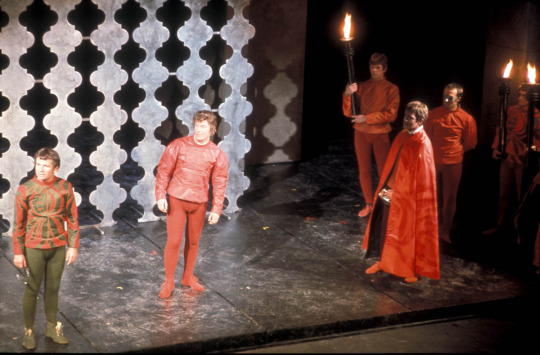

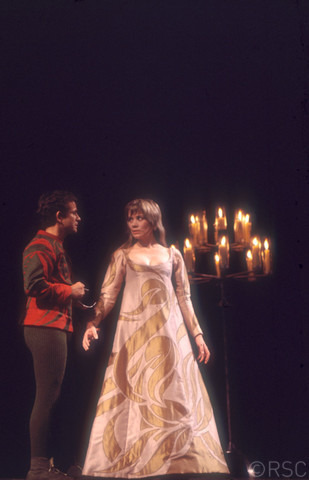
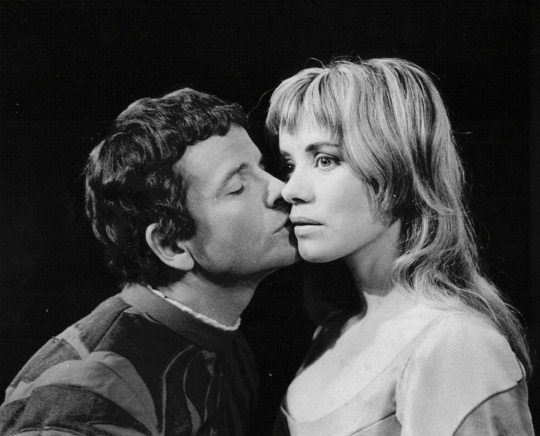

Dolhai Attila, 2001
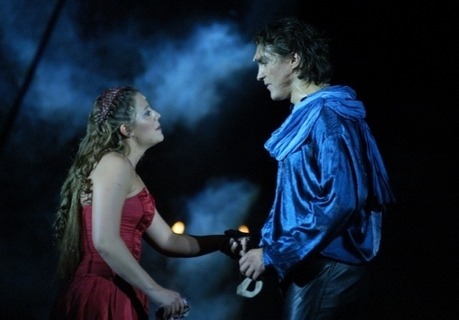
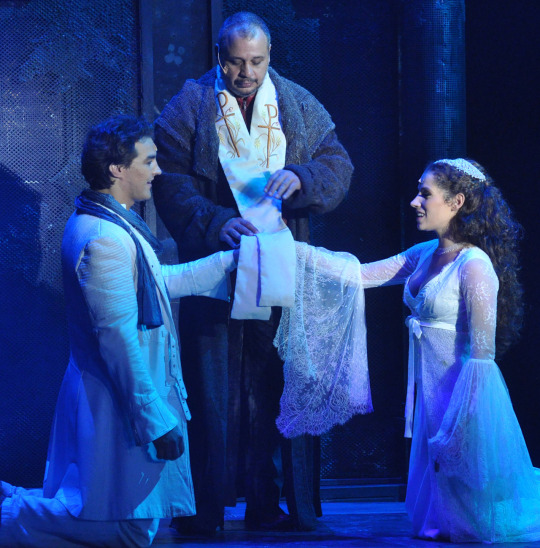
Adetomiwa Edun, 2010
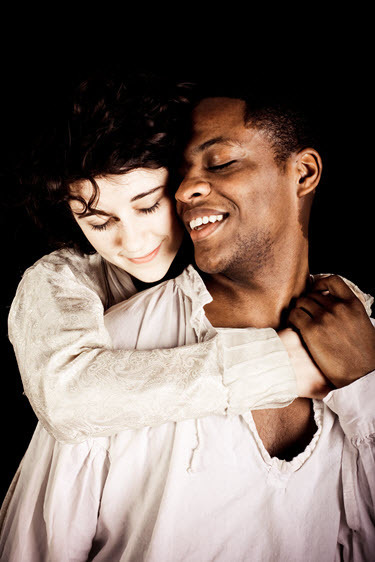
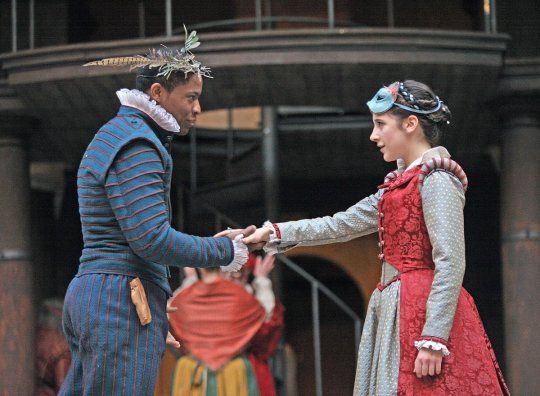
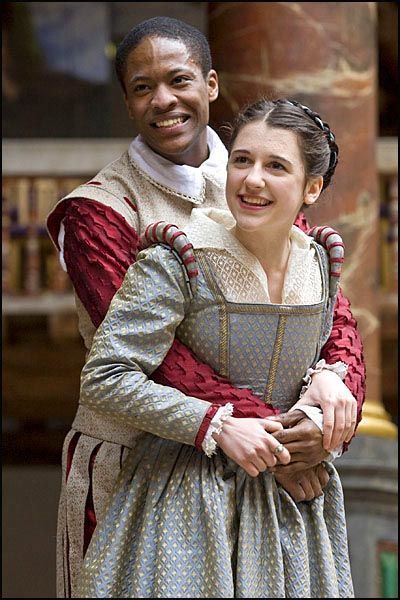
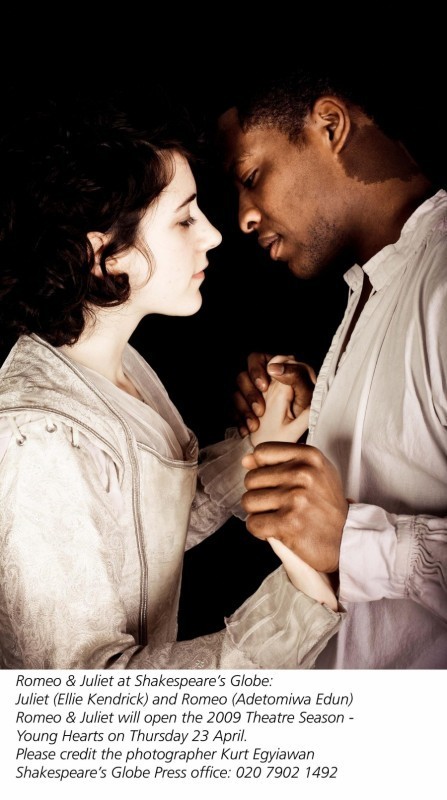
Eduardo Moreira, 2012/13

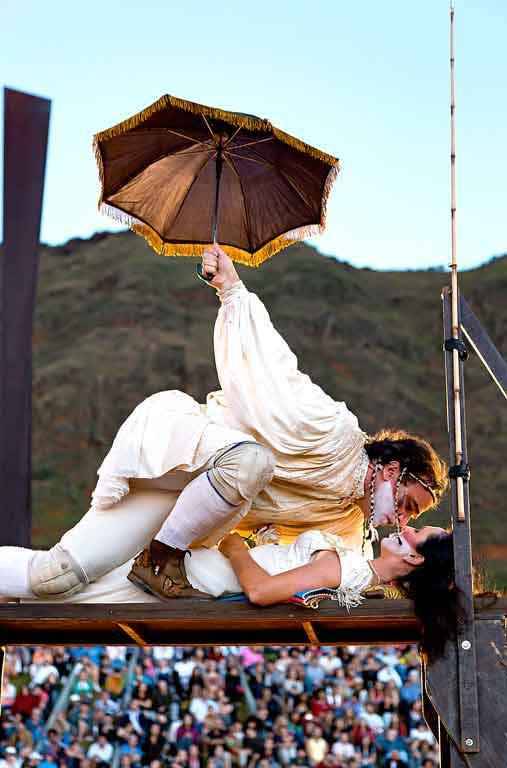
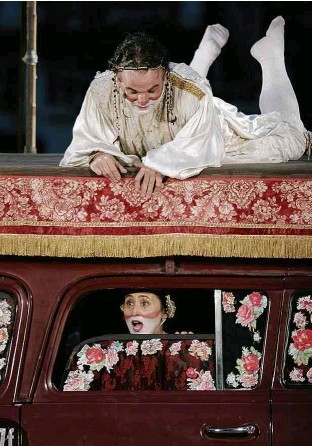
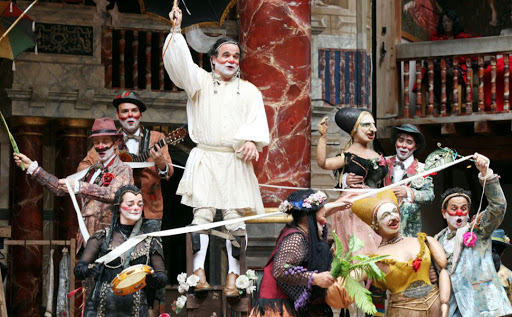
Lucien Laviscount in the Still Star-Crossed series, 2017
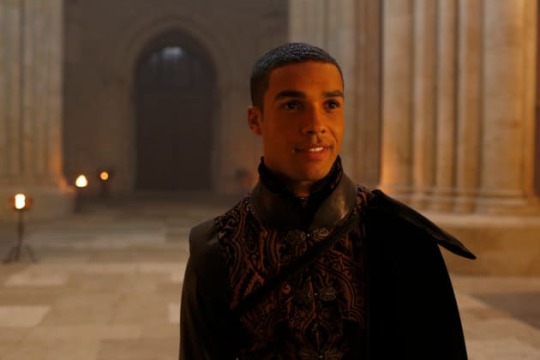
12 notes
·
View notes
Text
SCENE II. Another part of the wood.
SCENE II. Another part of the wood.
Enter OBERON
OBERON
Enter PUCK
PUCK
My mistress with a monster is in love. Near to her close and consecrated bower, While she was in her dull and sleeping hour, A crew of patches, rude mechanicals, That work for bread upon Athenian stalls, Were met together to rehearse a play Intended for great Theseus' nuptial-day. The shallowest thick-skin of that barren sort, Who Pyramus presented, in their sport Forsook his scene and enter'd in a brake When I did him at this advantage take, An ass's nole I fixed on his head: Anon his Thisbe must be answered, And forth my mimic comes. When they him spy, As wild geese that the creeping fowler eye, Or russet-pated choughs, many in sort, Rising and cawing at the gun's report, Sever themselves and madly sweep the sky, So, at his sight, away his fellows fly; And, at our stamp, here o'er and o'er one falls; He murder cries and help from Athens calls. Their sense thus weak, lost with their fears thus strong, Made senseless things begin to do them wrong; For briers and thorns at their apparel snatch; Some sleeves, some hats, from yielders all things catch. I led them on in this distracted fear, And left sweet Pyramus translated there: When in that moment, so it came to pass, Titania waked and straightway loved an ass.
OBERON
This falls out better than I could devise. But hast thou yet latch'd the Athenian's eyes With the love-juice, as I did bid thee do?
PUCK
Enter HERMIA and DEMETRIUS
OBERON
Stand close: this is the same Athenian.
PUCK
This is the woman, but not this the man.
DEMETRIUS
O, why rebuke you him that loves you so? Lay breath so bitter on your bitter foe.
HERMIA
Now I but chide; but I should use thee worse, For thou, I fear, hast given me cause to curse, If thou hast slain Lysander in his sleep, Being o'er shoes in blood, plunge in the deep, And kill me too. The sun was not so true unto the day As he to me: would he have stolen away From sleeping Hermia? I'll believe as soon This whole earth may be bored and that the moon May through the centre creep and so displease Her brother's noontide with Antipodes. It cannot be but thou hast murder'd him; So should a murderer look, so dead, so grim.
DEMETRIUS
So should the murder'd look, and so should I, Pierced through the heart with your stern cruelty: Yet you, the murderer, look as bright, as clear, As yonder Venus in her glimmering sphere.
HERMIA
What's this to my Lysander? where is he? Ah, good Demetrius, wilt thou give him me?
DEMETRIUS
I had rather give his carcass to my hounds.
HERMIA
Out, dog! out, cur! thou drivest me past the bounds Of maiden's patience. Hast thou slain him, then? Henceforth be never number'd among men! O, once tell true, tell true, even for my sake! Durst thou have look'd upon him being awake, And hast thou kill'd him sleeping? O brave touch! Could not a worm, an adder, do so much? An adder did it; for with doubler tongue Than thine, thou serpent, never adder stung.
DEMETRIUS
You spend your passion on a misprised mood: I am not guilty of Lysander's blood; Nor is he dead, for aught that I can tell.
HERMIA
I pray thee, tell me then that he is well.
DEMETRIUS
An if I could, what should I get therefore?
HERMIA
Exit
DEMETRIUS
Lies down and sleeps
OBERON
What hast thou done? thou hast mistaken quite And laid the love-juice on some true-love's sight: Of thy misprision must perforce ensue Some true love turn'd and not a false turn'd true.
PUCK
Then fate o'er-rules, that, one man holding troth, A million fail, confounding oath on oath.
OBERON
About the wood go swifter than the wind, And Helena of Athens look thou find: All fancy-sick she is and pale of cheer, With sighs of love, that costs the fresh blood dear: By some illusion see thou bring her here: I'll charm his eyes against she do appear.
PUCK
Exit
OBERON
Re-enter PUCK
PUCK
Captain of our fairy band, Helena is here at hand; And the youth, mistook by me, Pleading for a lover's fee. Shall we their fond pageant see? Lord, what fools these mortals be!
OBERON
Stand aside: the noise they make Will cause Demetrius to awake.
PUCK
Enter LYSANDER and HELENA
LYSANDER
Why should you think that I should woo in scorn? Scorn and derision never come in tears: Look, when I vow, I weep; and vows so born, In their nativity all truth appears. How can these things in me seem scorn to you, Bearing the badge of faith, to prove them true?
HELENA
You do advance your cunning more and more. When truth kills truth, O devilish-holy fray! These vows are Hermia's: will you give her o'er? Weigh oath with oath, and you will nothing weigh: Your vows to her and me, put in two scales, Will even weigh, and both as light as tales.
LYSANDER
I had no judgment when to her I swore.
HELENA
Nor none, in my mind, now you give her o'er.
LYSANDER
Demetrius loves her, and he loves not you.
DEMETRIUS
[Awaking] O Helena, goddess, nymph, perfect, divine! To what, my love, shall I compare thine eyne? Crystal is muddy. O, how ripe in show Thy lips, those kissing cherries, tempting grow! That pure congealed white, high Taurus snow, Fann'd with the eastern wind, turns to a crow When thou hold'st up thy hand: O, let me kiss This princess of pure white, this seal of bliss!
HELENA
O spite! O hell! I see you all are bent To set against me for your merriment: If you we re civil and knew courtesy, You would not do me thus much injury. Can you not hate me, as I know you do, But you must join in souls to mock me too? If you were men, as men you are in show, You would not use a gentle lady so; To vow, and swear, and superpraise my parts, When I am sure you hate me with your hearts. You both are rivals, and love Hermia; And now both rivals, to mock Helena: A trim exploit, a manly enterprise, To conjure tears up in a poor maid's eyes With your derision! none of noble sort Would so offend a virgin, and extort A poor soul's patience, all to make you sport.
LYSANDER
You are unkind, Demetrius; be not so; For you love Hermia; this you know I know: And here, with all good will, with all my heart, In Hermia's love I yield you up my part; And yours of Helena to me bequeath, Whom I do love and will do till my death.
HELENA
Never did mockers waste more idle breath.
DEMETRIUS
Lysander, keep thy Hermia; I will none: If e'er I loved her, all that love is gone. My heart to her but as guest-wise sojourn'd, And now to Helen is it home return'd, There to remain.
LYSANDER
Helen, it is not so.
DEMETRIUS
Re-enter HERMIA
HERMIA
Dark night, that from the eye his function takes, The ear more quick of apprehension makes; Wherein it doth impair the seeing sense, It pays the hearing double recompense. Thou art not by mine eye, Lysander, found; Mine ear, I thank it, brought me to thy sound But why unkindly didst thou leave me so?
LYSANDER
Why should he stay, whom love doth press to go?
HERMIA
What love could press Lysander from my side?
LYSANDER
Lysander's love, that would not let him bide, Fair Helena, who more engilds the night Than all you fiery oes and eyes of light. Why seek'st thou me? could not this make thee know, The hate I bear thee made me leave thee so?
HERMIA
You speak not as you think: it cannot be.
HELENA
Lo, she is one of this confederacy! Now I perceive they have conjoin'd all three To fashion this false sport, in spite of me. Injurious Hermia! most ungrateful maid! Have you conspired, have you with these contrived To bait me with this foul derision? Is all the counsel that we two have shared, The sisters' vows, the hours that we have spent, When we have chid the hasty-footed time For parting us,--O, is it all forgot? All school-days' friendship, childhood innocence? We, Hermia, like two artificial gods, Have with our needles created both one flower, Both on one sampler, sitting on one cushion, Both warbling of one song, both in one key, As if our hands, our sides, voices and minds, Had been incorporate. So we grow together, Like to a double cherry, seeming parted, But yet an union in partition; Two lovely berries moulded on one stem; So, with two seeming bodies, but one heart; Two of the first, like coats in heraldry, Due but to one and crowned with one crest. And will you rent our ancient love asunder, To join with men in scorning your poor friend? It is not friendly, 'tis not maidenly: Our sex, as well as I, may chide you for it, Though I alone do feel the injury.
HERMIA
I am amazed at your passionate words. I scorn you not: it seems that you scorn me.
HELENA
Have you not set Lysander, as in scorn, To follow me and praise my eyes and face? And made your other love, Demetrius, Who even but now did spurn me with his foot, To call me goddess, nymph, divine and rare, Precious, celestial? Wherefore speaks he this To her he hates? and wherefore doth Lysander Deny your love, so rich within his soul, And tender me, forsooth, affection, But by your setting on, by your consent? What thought I be not so in grace as you, So hung upon with love, so fortunate, But miserable most, to love unloved? This you should pity rather than despise.
HERNIA
I understand not what you mean by this.
HELENA
Ay, do, persever, counterfeit sad looks, Make mouths upon me when I turn my back; Wink each at other; hold the sweet jest up: This sport, well carried, shall be chronicled. If you have any pity, grace, or manners, You would not make me such an argument. But fare ye well: 'tis partly my own fault; Which death or absence soon shall remedy.
LYSANDER
Stay, gentle Helena; hear my excuse: My love, my life my soul, fair Helena!
HELENA
O excellent!
HERMIA
Sweet, do not scorn her so.
DEMETRIUS
If she cannot entreat, I can compel.
LYSANDER
Thou canst compel no more than she entreat: Thy threats have no more strength than her weak prayers. Helen, I love thee; by my life, I do: I swear by that which I will lose for thee, To prove him false that says I love thee not.
DEMETRIUS
I say I love thee more than he can do.
LYSANDER
If thou say so, withdraw, and prove it too.
DEMETRIUS
Quick, come!
HERMIA
Lysander, whereto tends all this?
LYSANDER
Away, you Ethiope!
DEMETRIUS
No, no; he'll [ ] Seem to break loose; take on as you would follow, But yet come not: you are a tame man, go!
LYSANDER
Hang off, thou cat, thou burr! vile thing, let loose, Or I will shake thee from me like a serpent!
HERMIA
Why are you grown so rude? what change is this? Sweet love,--
LYSANDER
Thy love! out, tawny Tartar, out! Out, loathed medicine! hated potion, hence!
HERMIA
Do you not jest?
HELENA
Yes, sooth; and so do you.
LYSANDER
Demetrius, I will keep my word with thee.
DEMETRIUS
I would I had your bond, for I perceive A weak bond holds you: I'll not trust your word.
LYSANDER
What, should I hurt her, strike her, kill her dead? Although I hate her, I'll not harm her so.
HERMIA
What, can you do me greater harm than hate? Hate me! wherefore? O me! what news, my love! Am not I Hermia? are not you Lysander? I am as fair now as I was erewhile. Since night you loved me; yet since night you left me: Why, then you left me--O, the gods forbid!-- In earnest, shall I say?
LYSANDER
Ay, by my life; And never did desire to see thee more. Therefore be out of hope, of question, of doubt; Be certain, nothing truer; 'tis no jest That I do hate thee and love Helena.
HERMIA
O me! you juggler! you canker-blossom! You thief of love! what, have you come by night And stolen my love's heart from him?
HELENA
Fine, i'faith! Have you no modesty, no maiden shame, No touch of bashfulness? What, will you tear Impatient answers from my gentle tongue? Fie, fie! you counterfeit, you puppet, you!
HERMIA
Puppet? why so? ay, that way goes the game. Now I perceive that she hath made compare Between our statures; she hath urged her height; And with her personage, her tall personage, Her height, forsooth, she hath prevail'd with him. And are you grown so high in his esteem; Because I am so dwarfish and so low? How low am I, thou painted maypole? speak; How low am I? I am not yet so low But that my nails can reach unto thine eyes.
HELENA
I pray you, though you mock me, gentlemen, Let her not hurt me: I was never curst; I have no gift at all in shrewishness; I am a right maid for my cowardice: Let her not strike me. You perhaps may think, Because she is something lower than myself, That I can match her.
HERMIA
Lower! hark, again.
HELENA
Good Hermia, do not be so bitter with me. I evermore did love you, Hermia, Did ever keep your counsels, never wrong'd you; Save that, in love unto Demetrius, I told him of your stealth unto this wood. He follow'd you; for love I follow'd him; But he hath chid me hence and threaten'd me To strike me, spurn me, nay, to kill me too: And now, so you will let me quiet go, To Athens will I bear my folly back And follow you no further: let me go: You see how simple and how fond I am.
HERMIA
Why, get you gone: who is't that hinders you?
HELENA
A foolish heart, that I leave here behind.
HERMIA
What, with Lysander?
HELENA
With Demetrius.
LYSANDER
Be not afraid; she shall not harm thee, Helena.
DEMETRIUS
No, sir, she shall not, though you take her part.
HELENA
O, when she's angry, she is keen and shrewd! She was a vixen when she went to school; And though she be but little, she is fierce.
HERMIA
'Little' again! nothing but 'low' and 'little'! Why will you suffer her to flout me thus? Let me come to her.
LYSANDER
Get you gone, you dwarf; You minimus, of hindering knot-grass made; You bead, you acorn.
DEMETRIUS
You are too officious In her behalf that scorns your services. Let her alone: speak not of Helena; Take not her part; for, if thou dost intend Never so little show of love to her, Thou shalt aby it.
LYSANDER
Now she holds me not; Now follow, if thou darest, to try whose right, Of thine or mine, is most in Helena.
DEMETRIUS
Exeunt LYSANDER and DEMETRIUS
HERMIA
You, mistress, all this coil is 'long of you: Nay, go not back.
HELENA
Exit
HERMIA
Exit
OBERON
This is thy negligence: still thou mistakest, Or else committ'st thy knaveries wilfully.
PUCK
Believe me, king of shadows, I mistook. Did not you tell me I should know the man By the Athenian garment be had on? And so far blameless proves my enterprise, That I have 'nointed an Athenian's eyes; And so far am I glad it so did sort As this their jangling I esteem a sport.
OBERON
Thou see'st these lovers seek a place to fight: Hie therefore, Robin, overcast the night; The starry welkin cover thou anon With drooping fog as black as Acheron, And lead these testy rivals so astray As one come not within another's way. Like to Lysander sometime frame thy tongue, Then stir Demetrius up with bitter wrong; And sometime rail thou like Demetrius; And from each other look thou lead them thus, Till o'er their brows death-counterfeiting sleep With leaden legs and batty wings doth creep: Then crush this herb into Lysander's eye; Whose liquor hath this virtuous property, To take from thence all error with his might, And make his eyeballs roll with wonted sight. When they next wake, all this derision Shall seem a dream and fruitless vision, And back to Athens shall the lovers wend, With league whose date till death shall never end. Whiles I in this affair do thee employ, I'll to my queen and beg her Indian boy; And then I will her charmed eye release From monster's view, and all things shall be peace.
PUCK
My fairy lord, this must be done with haste, For night's swift dragons cut the clouds full fast, And yonder shines Aurora's harbinger; At whose approach, ghosts, wandering here and there, Troop home to churchyards: damned spirits all, That in crossways and floods have burial, Already to their wormy beds are gone; For fear lest day should look their shames upon, They willfully themselves exile from light And must for aye consort with black-brow'd night.
OBERON
Exit
PUCK
Re-enter LYSANDER
LYSANDER
Where art thou, proud Demetrius? speak thou now.
PUCK
Here, villain; drawn and ready. Where art thou?
LYSANDER
I will be with thee straight.
PUCK
Exit LYSANDER, as following the voice
Re-enter DEMETRIUS
DEMETRIUS
Lysander! speak again: Thou runaway, thou coward, art thou fled? Speak! In some bush? Where dost thou hide thy head?
PUCK
Thou coward, art thou bragging to the stars, Telling the bushes that thou look'st for wars, And wilt not come? Come, recreant; come, thou child; I'll whip thee with a rod: he is defiled That draws a sword on thee.
DEMETRIUS
Yea, art thou there?
PUCK
Exeunt
Re-enter LYSANDER
LYSANDER
Lies down
Sleeps
Re-enter PUCK and DEMETRIUS
PUCK
Ho, ho, ho! Coward, why comest thou not?
DEMETRIUS
Abide me, if thou darest; for well I wot Thou runn'st before me, shifting every place, And darest not stand, nor look me in the face. Where art thou now?
PUCK
Come hither: I am here.
DEMETRIUS
Lies down and sleeps
Re-enter HELENA
HELENA
Lies down and sleeps
PUCK
Re-enter HERMIA
HERMIA
Lies down and sleeps
PUCK
Squeezing the juice on LYSANDER's eyes
Exit
0 notes